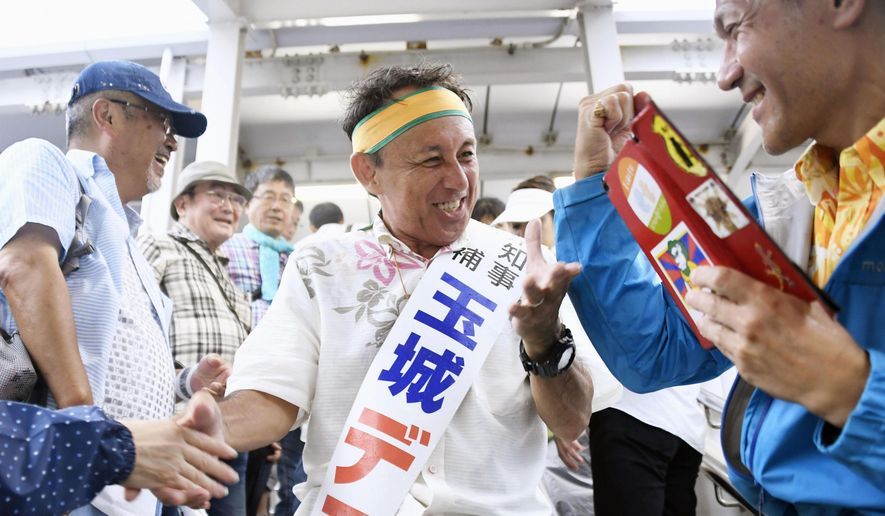TOKYO — Denny Tamaki, who campaigned criticizing the American military presence on the southwestern Japanese islands of Okinawa, won the election for governor Sunday, defeating a ruling party-backed candidate pushing the status quo.
The race was to choose a successor to Takeshi Onaga, who died in August of pancreatic cancer. He wanted the bases off Okinawa.
Tamaki, a legislator who had pledged to continue with Onaga’s “spirit,” thanked his supporters as his campaign office broke into a cheer and later began dancing Okinawa-style, after several major Japanese media polls, including Kyodo news service, declared him the winner.
“The strong feelings of Takeshi Onaga, risking his life to stop the construction of any more bases, helped bring this victory,” Tamaki told reporters.
He defeated Atsushi Sakima, a mayor who had argued that Okinawa should work with the national government to sort out the problem. The final vote count was not yet available. But media reports said Tamaki led in almost all areas of Okinawa, making his win certain with the vote partially counted.
Tamaki’s victory throws into further question Japan’s plans for a new air base still under construction in coastal Okinawa.
Okinawa houses about half of the 54,000 American troops stationed in Japan and makes for 64 percent of the land space used by the U.S. bases, under a bilateral security treaty, according to John S. Hutcheson, spokesman for the U.S. Forces in Japan.
The arrangement has long been protested by some as an unfair burden on Okinawa, which makes up less than 1 percent of Japan’s land space.
Japan remains highly dependent on the U.S. for defense, but crimes by members of the military, including hit-and-runs as well as rapes, have outraged the people of Okinawa. They are also angry about noise pollution and the dangers of crashes from military aircraft.
Tamaki, whose father is a U.S. Marine he has never met, has often said he is a symbol of the predicament of his people. His mother is Japanese.
“I can clearly state we no longer want in Okinawa the U.S. bases that destroy our peace and destroy our nature,” Tamaki, 58, said during his campaign.
He has promised policies that care about “the weak,” helping workers, students and those who face discrimination.
Before running for governor, Sakima, 54, was mayor of Ginowan, where the Marines air base called Futenma is located.
Futenma is at the center of the controversy over the government relocation plan for U.S. troops to less densely populated Henoko in Nago, Okinawa.
The planning dates back to the 1995 rape of a schoolgirl in which three U.S. servicemen were convicted. But the planning and construction of Henoko has repeatedly been delayed because of local opposition to the bases.
Some are also pointing to the threat that base construction, which includes a landfill, may bring to the environment, including to a coral reef and dugong and other marine life.
Outside of Okinawa, the national government and public opinion appear to support strengthening Japan’s security measures as it faces nuclear threats from North Korea and the growing military might of China. U.S. President Donald Trump’s administration also has been pushing Japan to do more to defend itself.
Tamaki, facing his supporters, who at times broke into joyous chants of “Denny! Denny! Denny!” said his win showed that the people don’t want the new base in Henoko.
“Henoko will not be allowed,” said Tamaki.
“We are all family on earth,” he said of dealing with the U.S. “How we can co-exist in understanding and peace should be our starting point.”




Please read our comment policy before commenting.